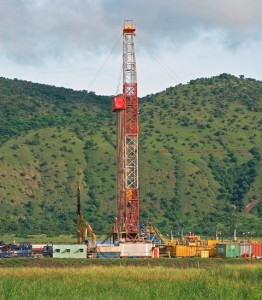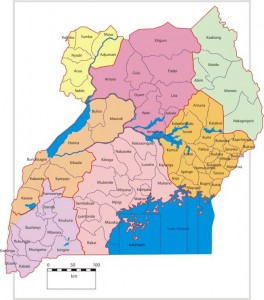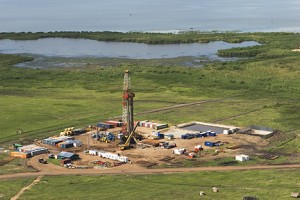The potential that Uganda’s oil sector presents has been confirmed beyond doubt. Tullow Uganda Country Manager, Brian Glover says if Uganda can produce 200, 000 barrels of oil per day, it would generate $5 billion (about 12 trillion shillings) in export earnings for the country, whose current total export earnings stand at $2billion. But according to updates from Tullow Oil Uganda and Heritage Oil, Uganda already has a confirmed production capacity of 40, 000 barrels of oil per day.
Huge Oil Deposits Confirmed in Western Uganda
The confirmation of commercially viable oil wells in mid western Uganda has generated a lot of excitement and expectations amongst Ugandans. Many people believe the country’s fortunes are on a roundabout towards better development and better life for ordinary Ugandans if the government fulfills its promise of investing oil proceeds to boost provision of social services across the country.
President Yoweri Museveni recently announced that the money Uganda will get from oil will be used to implement the country’s National Development Plan that was launched last week.
Paul Atherton, the Chief Financial Officer of Tullow Oil says the Buffalo-Giraffe field alone which is 9,000 square kilometers in size has several “billions of barrels of oil in place”.Tony Buckingham, Heritage Uganda’s Chief Executive Officer agrees that they now have reserves way above the “commercial threshold” for pursuing oil production.
Big Potential for Oil Production
It is therefore understandable that many Ugandans are expecting better roads, well built health centers stocked with medicines, more reliable energy as well as better paid public servants- teachers, health workers, police, prisons and the army all want better salaries.
But no where is this excitement and expectation as high as in Bunyoro Kingdom, the area that contains much of the Albertine Graben, the country’s oil exploration frontier.
President Yoweri Museveni has boisterously assured Uganda that the government will judiciously invest the proceeds from oil, which are expected to launch Uganda into the desired level of development. Museveni says apart from offsetting the country’s oil needs (saving Uganda millions dollars it has been spending in oil imports), and supporting the country’s power generation for industrial development, proceeds from oil will be ploughed into critical development sectors like education, health and infrastructure.
With such assurances from the President, you can not blame Jane Asiimwe for believing that all feeder roads in her home sub-county of Kyangwali in Hoima will soon be tarmacked courtesy of oil proceeds.
Bunyoro counting on oil benefits
The news of discovery (some prefer to call confirmation) of huge oil deposits in the area have brought smiles on the faces of the usually grumbling Banyoro.
Henry Ford Mirima, the Press Secretary to the King of Bunyoro Kitara says the discovery of oil has added to the urgency of Banyoro to want “to wake up and getting out of the slumber they were thrown into when the Anglo-Ganda conquests that made the region slump into economic and social backwardness.
“Banyoro see the discovery of oil as God’s remembrance of His children which have suffered war atrocities at the hands of the British colonialists. We feel God has given us this oil in order to console us for the sufferings we have undergone in the last over 100 years,” Mirima says.
The Kingdom’s officials have been busy preparing their demands to get a share of the oil proceeds since Heritage Oil and Tullow Oil started confirming oil deposits in their drilling exploration campaign in Bunyoro that started in 2006.
Uganda activists want clear oil benefits
Shem Byakagaba, the President of Kitara Heritage Development Association says that since people in Bunyoro region expect to be most affected by the oil exploitation, they should be allocated “a good share” of the oil proceeds as royalties. Byakabaga says people of Bunyoro expect to be given a share of oil proceeds under Bunyoro Kitara kingdom which will invest the money to improve the lives of people in the area.
But the law provides for royalties to the “local government” in the area where the mineral is located. Bunyoro kingdom is not a recognized administrative area, with the district and sub-country the only recognized local governments.
The Minister of Energy and Mineral development, Hillary Onek says the Oil Policy and the Mineral Exploration Act provides for the allocation of royalties to districts where the mineral resources are located (in this case Bulisa, Hoima and Amuru); and a percentage is also paid to the land owners, in which category Bunyoro Kingdom might fall.
Such a position from government has continued to shroud in a doubt a demand that many people in Bunyoro think is obvious.
George Tinkasiimire, the LC5 Chairperson of Hoima district says the people in the region want to receive royalties as Bunyoro kingdom and not as districts or sub-counties. This might be the reason why districts of Bunyoro fervently support the government proposal of a regional tier, which would enable cooperating districts operate together as an administrative unit. While this is a strong demand, it will raise concerns for the government since some oil producing areas like Amuru district are not organized under any kingdom of sorts. This might explain why minister Onek is greatly discouraging what he calls “sectarian demands” to benefit from oil, arguing that oil should be looked at as a resource for the whole country.
Environmental concerns of oil production
Mirima says the government must ensure Bunyoro kingdom benefits from the oil because they are keenly aware of “the misery, torture and even executions that befell indigenous people in oil-producing areas like in Nigeria and Chad” and would not take any chances. Nigeria which has been exporting over 2.5 million barrels per day over the past about 10 years still has some of the worst forms of poverty and social unrest in the world.
“The environment in the region will be greatly affected by oil production activities. Agriculture productivity will reduce, yet most of the people in the oil producing area depend on agriculture. In some countries, oil production is known to have increased the disease burden in the neighboring communities due to disposal of the waste oil and the resulting environmental impacts that support parasites,” he says.
For now, the concern is that despite a string of discoveries in all the 20 drilled oil wells, oil production is not about to start. The government has had to extended the early production scheme from November 2009 to early next year.
Oil production in Uganda expected to start
Ernest Rubondo, the Commissioner for Petroleum Exploration and Production Department told Parliament recently that the government expects to start the early scheme production by June 2010. The scheme will see the establishment a mini refinery to produce diesel to supply at least 80Mega watts to the national grid as one of the government’s measures to boost energy supply in the country.
It is expected that the government will later build an 806-mile pipeline to take oil to Kampala, and then the Kenyan coast city of Mombassa. The pipeline will cost an estimated $1.5 billion (more than 3 trillion shillings) to complete. Luckily, the discoveries made by Tullow and Heritage have surpassed the 400 million barrels mark needed ton justify such investment.
“We should be thinking along the lines of refining the oil here in Uganda and exporting the finished product. The idea of governments exporting crude oil then using the revenue from it to import refined oil sounds more like selling a live chicken in order to buy a cooked one!” says Judy Auma in article for the African Executive.
Need for skills for Uganda and Africa to exploit oil sector
Auma adds that as Africa becomes an increasing supplier of global energy, it should develop capacity to provide the now scarce industrial skills. “The continent should work towards Africans testing, exploring, drilling as well as refining oil. That is when the big bucks will start rolling, ushering Africa to First World status,” she says.
The government recently announced that Kigumba Cooperative College located in Masindi district will become the Petroleum Institute that will be key in training the labour force needed for the oil industry. Amidst concerns of whether there is a relevant curriculum to produce the required graduates for the oil industry, concerns are also emerging on limited funding planned for the Petroleum Institute.
Uganda Petroleum Institute at Kigumba
The Woman MP for Masindi district, Jalia Bintu says although the government has budgeted for three billion shillings for the Petroleum Institute in the 2009/2010 financial year, another three billion shillings will be needed in the 2010/2011 financial year to put the institute at the required level of training competent oil workforce.
According to Elly Karuhanga, a Director at Tullow Oil Uganda, the company is working with the government to support the Petroleum Institute which will train people with expertise in different fields of the oil industry, including exploration, contracting, production, marketing, revenue and management.
As all this is being planned, many Ugandans especially in the oil prospecting areas are continuing to outline their expectations. Hoima Woman MP, Beatrice Nyakaisiki says with the confirmed high potential of oil in the region, the local people expect the oil companies and the government to undertake a lot of social responsibility investments, which will see construction and facilitation of schools, health centers, roads and other social amenities in the neigbouring areas.
Local governments expect increased tax revenues
The local governments especially in Hoima and Bulisa are also looking at increased tax revenues resulting from taxes on increasing activities in their areas due to the oil boom. An oil city is expected to be established in Hoima, and the district Chairperson, George Tinkasiimire says the locals expect many opportunities in jobs and better social services.
Already, the oil companies are working with local councils in the area to employ local people in the oil sites. Some benefits like extension of infrastructure such as roads and communication as well as provision of clean water from boreholes to the communities, as well as building schools are already being realized in areas of Kyangwali where oil exploration first achieved results.
According to Glover, the oil industry is expected to generate 10, 000 jobs once full scale commercial oil production is ongoing. The industry will also provide a lot of market for food, accommodation as well as market for local products and services.
Service sector to be boosted by Uganda oil
It is this service sector for the oil sector that the 2nd Deputy Prime Minister and Minister of Public Service, Henry Muganwa Kajura wants the people in Bunyoro and other oil producing areas in northern Uganda to concentrate on.
Kajura says that while he supports demands by Bunyoro kingdom to be given a percentage of the oil revenues, he believes the local people can benefit more from the presence of oil in the area by starting up service businesses to tap opportunities provided by the oil sector.
He says local companies that provide services such as catering, housing, clearing and forwarding, providers of heavy machinery, chartered fights, food and security will continue to benefit through provision of services during exploration programmes.





Pingback: Tullow Oil risks losing assets in Uganda following suit to halt petroleum activities | New Informers